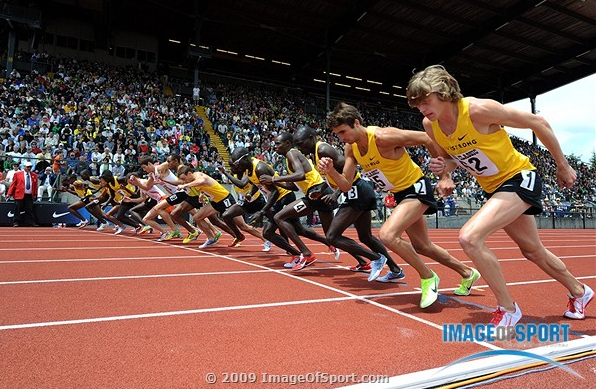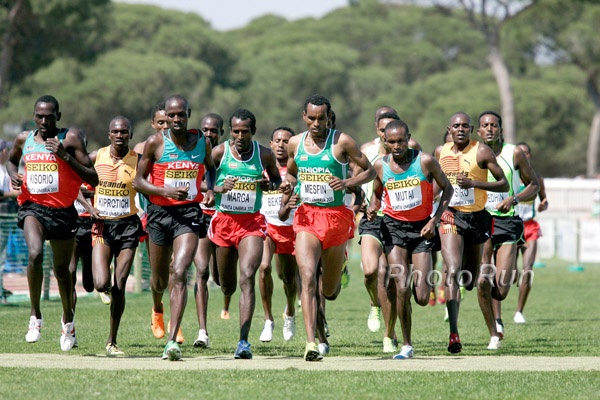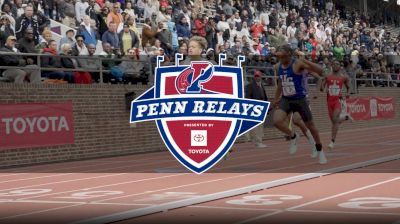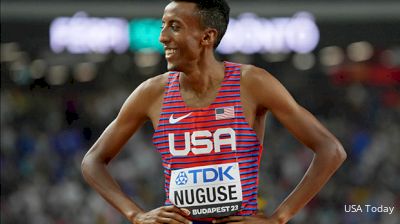2013 IAAF World Cross Country ChampionshipsMar 20, 2013 by Mitch Kastoff
A Case for the World Cross Country Championships
A Case for the World Cross Country Championships

It’s the hardest race to win. There’s a rich history, passionate support, and glory behind it. So why isn’t there a stronger emphasis for World Cross Country Championships?
Let's look at what it'll take. In the most basic terms, why do sports attract fan bases?
1) Vicariousness
2) Simplicity
3) Star power
World Cross has all of the qualities that could entice the average fan, whether they're a runner or not. But still, the United States doesn’t have unconditional commitment from its fans or athletes towards the race. What would it take for the U.S. to love the “hardest race to win?”
Vicariousness
Why does anyone enjoy certain sports? Is it because they enjoy colorful jerseys, the charismatic owners, or the cartoonish mascots?
It’s vicariousness. It’s empathy. It’s because at some point in your life, someone played a sport and has an understanding for the rules and required technical skill. Even if you haven’t played football since the days of pop warner or powderpuff games, you can still appreciate Aaron Rodger's laser-like ability to lauch a 70 yard touchdown pass.
Thats why the professionals get paid an incredible amount of money. They’re better than us. In economic terms, the supply of labor of guys who can throw 100mph fastballs is less than the guy who can teach a high school history class. You might not consider it “hard work,” but high-level athletes are scarce and teams (and companies) are willing to pay them for their rare set of skills.
Take a large amount of the general population who play a sport, add a few athletes who have unbelievable talent, and you have a strong following.
Then we have cross country. The numbers are there. This fall, the Wall Street Journal reported that NCAA Division I participation in cross country has gone up 19%. I don’t know how many people in the U.S. have run a 5k road race or marathon in the past year, but I’d venture to guess a bunch. A lot of people can watch in awe at some of the marks being thrown down by professionals. There's a clear difference between us and them.
Even for the non-runner, you can still have an appreciation for the sport. Take ASICS’ ad for the 2011 NYC Marathon featuring Ryan Hall. Brilliant marketing and a strong message that says Ryan Hall is better than you at the marathon. It might look like a jog, but on the street-level, these guys are flying.
In Poland, they won’t be flying on asphalt, but snow, grass, and mud.
Simplicity
No popular sport in America is complex in terms of the “who” and the “what.”
“Who’s playing tonight?”
“The Heat and the Celtics.”
/end discussion
If you’re a casual fan, you probably have a general idea about each team. If you don't, then why are you asking the question in the first place?
Then there’s simplicity to the game itself.
Have you ever tried to explain a sport to an uninformed friend? He might be from another country, he might have never watched the sport before, or in the most adorable sense, this someone might be your girlfriend trying to share some of your interests.
When presenting the game, you start with the most important aspect. The main objective is to put the [insert object] into the goal, hoop, or over the fence. Forget the nuances of the Infield Fly Rule or the Tuck Rule (goodbye forever), the core thing is how to score points.
You may have had some friends o family members finally ask, “How does cross country work?” You explain the point system: First place is one, second place is two, and so on. The cumulative score from top five runners from each team determines the winner. “Got it,” they respond.
With a few exceptions, World Cross is simple. There aren’t two teams, but at least they’re clearly defined. No, not by shoe companies, but by country. The top four from each country score and lowest score wins. Got it.

Though the U.S. does field a team every few years for Olympics and World Championships, I don’t really consider it a “team.” Unless you consider “overall medal count” as points, it’s more of a general association required for the competition to make sense. It sounds harsh, but Team USA is just a noun and not something that you can support in the same way as lets say, the U.S. World Cross team.
This isn’t by any means a knock on Team USA, but an argument saying that Team USA World Cross is more of a team in the traditional sense.
The simplicity doesn’t just exist on the macro-level for the teams, but on the micro-level as well. How would you answer, “Who is the best American distance runner?”
Right now, is it Galen Rupp? After his mile/3000m, indoor campaign plus his 5k/10k credentials, surely it’s him, right? But what about Bernard Lagat, who took back his indoor 2-mile record? Or Lopez Lomong, who ran a comparable mile to Rupp and broke the indoor 5000m record?
It’s a subjective question. But if you were to ask, “Who is competing for the Kenyan team,” the answer would be, “The best.”
Unlike the Olympics where multi-talented athletes choose to concentrate one event or lessen their medal chances and double (not looking at you, Mo Farah), the World XC teams consist of the best distance runners. Milers, steeplechasers, 5000m, 10000m, half-marathoners, and even marathoners drop down to the 12000m distance to compete for pride and country.
And unlike the Olympics, each country isn’t limited to three athletes per event. Each team can field six athletes per team, which means that if a certain stud is a junior, then the country still has room for him or her to compete.
In this sense, the Olympics is semi-diluted while World Cross is fully loaded. What’s the hardest race to win?
Pride
The passion behind the race isn’t just because it’s tough, but because it’s an international competition. Anytime athletes or fans attach themselves to something nationalistic, the intensity level is always going to be higher.
It’s more than supporting the local team. As a New Yorker, it’s tough to watch the Yankees lose, but I get over it. As an American, it’s heartbreaking to watch the U.S. get eliminated from the World Cup (though I know it’s inevitable). We’re so ingrained with patriotism that when another country can objectively tell us that they’re better, we don’t want to hear it.
The only solution other than covering your ears and yelling to drown out the cold, hard facts, is not to lose. That’s where rivalries come in.

Unlike some not-so-timeless rivalries, the competition for distance running supremacy in East Africa is filled with history past, present, and future.
They’re both good (understatement), they’re close (again, understatement), and they’re both in the upper echelon of the sport. It makes for a perfect rivalry. This is without getting into the political and social aspect of each nation.
But it hasn’t always been an equal battle. According to John Kwoba at Sina English, "Kenya and Ethiopia are the most successful countries in the history of the world cross-country championships, winning 119 of the 158 available team titles. Additionally, “The two countries have met 120 times where both have fielded full teams, with Kenya beating Ethiopia 78-42.”
Going back to our first point (being able to relate), how can we describe this rivalry? Back in 2005, Toni Reavis compared the competition in East African to the Red Sox and Yankees. Even though the two dislike one another, I wouldn’t call it vitriolic hatred.
Lakers and the Celtics? No. Packers and Bears? Nah. Duke and North Carolina? Closer (literally).
If we’re going for unbridled passion, then soccer (biased here) is the best answer. The first matchup that came up was Barcelona and Real Madrid. Though El Clasico is always intense, it’s not driven by hatred. If someone from another team goes down, the opposing side doesn’t applaud. Since the majority of the players from both sides make up the Spanish national team, then injuries aren’t greeted with happiness.
Unlike World Cross.
Back in 2007 when Mombasa, Kenya hosted World Cross, there was a small home field advantage for the Kenyans. When Kenenisa Bekele mistimed his laps, surged too early, and had to drop out, there weren’t a lot of upset faces in the crowd.
@9:24. By the way, look at the crowd for a cross country race.
Cheers for the defeat of the undefeatable. Where else do you see a combination of national pride, hatred for the opposition, and love for the sport?
The first example that Ryan Fenton brought up was Penn Relays. How strong is national pride in Philadelphia? Well, you can probably spot the Jamaicans in the crowd. But for the rest of the world, what event can they support? The DMR.
The DMR at Penn is literally the U.S. versus The World. It's the American dream team(s) versus the top middle-distance runners from Kenya, Ethiopia, Australia, Morocco, Canada, and more. But fans at Penn don't really hate the other relays. What other event can we use as an example?
Oh right, the World Cup. We probably should have heeded our own words about trying to explain things by going straight to the most important aspect.
World War II jokes? Never too soon.
What makes the World Cup special? Team crests are disregarded for national flags. It’s the thing that makes dream teams.
It doesn’t matter if you play for Manchester United or City or whether you run for Nike or adidas, it’s about where you’re born (or whoever paid you the most to move).
Training groups, agents, and event disciplines aside, World Cross is a dream team for distance running.
What else makes the World Cup special? It’s only every four years. There isn’t always “next year” and for some, there isn’t even a “next.”
Unlike in years past, World Cross isn’t every spring. Since its creation in 1973, the championship was held every year until 2012, when the event was moved to every other year (the decision came in 2009).
But it wasn’t moved to increase the allure of the event, but as Roger Robinson of Runners World explained, money and the evolution of the sport have caused it to be a biennial event.
We then reach what seems to be a reoccurring theme when talking about the sport, the problems and possible solutions.
The Big Stars Skip Out - Why?
Nothing drives sales up like a big star. Teams build franchises around certain athletes. Arenas can sell out seats, even if the person in question is past his or her prime. To be a successful team or event, it doesn't matter how deep the starting lineup or the field in the mile is; you need an A-lister.
If World Cross is so prestigious, why do the major stars sometime skip out? As Letsrun.com points out, “Money talks.” Compared to other events that athletes could run instead of World Cross, the payout is much better. Call it opportunity cost overriding national pride, but money is important.
Individual Prize Money
1st - $30,000
2nd - $15,000
3rd - $10,000
4th - $7,0000
5th - $5,000
6th - $3,000
Plus $60,000 in team prize money
The funds behind running also play a role in when the event takes place. While the World Championships are far enough away, the time between World Cross and a spring marathon is a small, risky window. So what should be done about the date?
Letsrun points out two possibilities of either moving the date up a few weeks or moving it to a summer when there’s no outdoor major championship? Both are viable, but there have been other suggestions to change the date of World Cross.
Not to the summer, though. If you look at pictures of the course in Poland right now, you’ll notice a bit of snow on the ground. You want real Euro-style cross country? Move World XC to the winter.
Back in 2009, the cross country greats drafted a letter to the International Olympic Committee to reintroduce cross country to the summer or winter Olympics. Though the summer would further weaken the race, if it was held in the winter, then things would be interesting.
AN OPEN LETTER to the
President of the IOC, Mr. Jacques Rogge and president of the IAAF, Mr. Lamine Diack
We the undersigned global champions and record breakers would like to invite your two highly esteemed federations to consider the re-introduction of cross country running into the Olympic Games programme, either as a summer or a winter sport.
Cross country running is of course the most natural, indeed elemental of all sports. It is a fascinating discipline whose roots are lost in the earliest history of mankind.
In the 1924 Olympic Games in Paris, cross country running was so far seen for the last time with the victory of one of the greatest ever Olympians, Finland’s Paavo Nurmi.
The official report at the time noted that a combination of unseasonal hot weather and the effects of the heat of a near-by industrial chimney – yes we had global warming in those days too! – meant that the air temperature on the course was as high as 36 degrees Centigrade (96.8 Fahrenheit). As such, of the 38 starts, 23 failed to finish. The problems of 1924 were certainly unique.
So we humbly and respectfully ask, what is your opinion about returning cross country running to a future Olympic Games, either on the programme of a summer or winter celebration.
We think it would be wonderful to give the worlds best cross country runners the chance to compete in the greatest of all sporting festivals, and are hopeful of a positive response.
Yours in sport,
Haile Gebrselassie, Kenenisa Bekele, Paul Tergat
Though the IAAF considered the move, it was ultimately rejected for the 2014 Games. Though there hasn’t been much discussion since 2010, the inclusion of XC for the 2018 Winter Olympics seems unlikely. According to rule 6.2 of the Olympic Charter, "only those sports which are practiced on snow and ice are considered as winter sports."
If you look at Bydgoszcz, Poland right now, you’d argue otherwise. But if you follow the rulebook, then cross country doesn’t fit the too convenient bill of the Winter Olympics.
If no major change will happen in the near future, then what remains for World Cross? It’s still one of the best distance running events around. It’s still the hardest running event to win. And hey, the U.S. team this year is solid (more on that later).
Despite its shortcomings, the World Cross Country Championships is still a cornerstone to the sport. What can bring the event back to the glory days?
Let's look at what it'll take. In the most basic terms, why do sports attract fan bases?
1) Vicariousness
2) Simplicity
3) Star power
World Cross has all of the qualities that could entice the average fan, whether they're a runner or not. But still, the United States doesn’t have unconditional commitment from its fans or athletes towards the race. What would it take for the U.S. to love the “hardest race to win?”
Vicariousness
Why does anyone enjoy certain sports? Is it because they enjoy colorful jerseys, the charismatic owners, or the cartoonish mascots?
It’s vicariousness. It’s empathy. It’s because at some point in your life, someone played a sport and has an understanding for the rules and required technical skill. Even if you haven’t played football since the days of pop warner or powderpuff games, you can still appreciate Aaron Rodger's laser-like ability to lauch a 70 yard touchdown pass.
Thats why the professionals get paid an incredible amount of money. They’re better than us. In economic terms, the supply of labor of guys who can throw 100mph fastballs is less than the guy who can teach a high school history class. You might not consider it “hard work,” but high-level athletes are scarce and teams (and companies) are willing to pay them for their rare set of skills.
Take a large amount of the general population who play a sport, add a few athletes who have unbelievable talent, and you have a strong following.
Then we have cross country. The numbers are there. This fall, the Wall Street Journal reported that NCAA Division I participation in cross country has gone up 19%. I don’t know how many people in the U.S. have run a 5k road race or marathon in the past year, but I’d venture to guess a bunch. A lot of people can watch in awe at some of the marks being thrown down by professionals. There's a clear difference between us and them.
Even for the non-runner, you can still have an appreciation for the sport. Take ASICS’ ad for the 2011 NYC Marathon featuring Ryan Hall. Brilliant marketing and a strong message that says Ryan Hall is better than you at the marathon. It might look like a jog, but on the street-level, these guys are flying.
In Poland, they won’t be flying on asphalt, but snow, grass, and mud.
Simplicity
No popular sport in America is complex in terms of the “who” and the “what.”
“Who’s playing tonight?”
“The Heat and the Celtics.”
/end discussion
If you’re a casual fan, you probably have a general idea about each team. If you don't, then why are you asking the question in the first place?
Then there’s simplicity to the game itself.
Have you ever tried to explain a sport to an uninformed friend? He might be from another country, he might have never watched the sport before, or in the most adorable sense, this someone might be your girlfriend trying to share some of your interests.
When presenting the game, you start with the most important aspect. The main objective is to put the [insert object] into the goal, hoop, or over the fence. Forget the nuances of the Infield Fly Rule or the Tuck Rule (goodbye forever), the core thing is how to score points.
You may have had some friends o family members finally ask, “How does cross country work?” You explain the point system: First place is one, second place is two, and so on. The cumulative score from top five runners from each team determines the winner. “Got it,” they respond.
With a few exceptions, World Cross is simple. There aren’t two teams, but at least they’re clearly defined. No, not by shoe companies, but by country. The top four from each country score and lowest score wins. Got it.

Though the U.S. does field a team every few years for Olympics and World Championships, I don’t really consider it a “team.” Unless you consider “overall medal count” as points, it’s more of a general association required for the competition to make sense. It sounds harsh, but Team USA is just a noun and not something that you can support in the same way as lets say, the U.S. World Cross team.
This isn’t by any means a knock on Team USA, but an argument saying that Team USA World Cross is more of a team in the traditional sense.
The simplicity doesn’t just exist on the macro-level for the teams, but on the micro-level as well. How would you answer, “Who is the best American distance runner?”
Right now, is it Galen Rupp? After his mile/3000m, indoor campaign plus his 5k/10k credentials, surely it’s him, right? But what about Bernard Lagat, who took back his indoor 2-mile record? Or Lopez Lomong, who ran a comparable mile to Rupp and broke the indoor 5000m record?
It’s a subjective question. But if you were to ask, “Who is competing for the Kenyan team,” the answer would be, “The best.”
Unlike the Olympics where multi-talented athletes choose to concentrate one event or lessen their medal chances and double (not looking at you, Mo Farah), the World XC teams consist of the best distance runners. Milers, steeplechasers, 5000m, 10000m, half-marathoners, and even marathoners drop down to the 12000m distance to compete for pride and country.
And unlike the Olympics, each country isn’t limited to three athletes per event. Each team can field six athletes per team, which means that if a certain stud is a junior, then the country still has room for him or her to compete.
In this sense, the Olympics is semi-diluted while World Cross is fully loaded. What’s the hardest race to win?
Pride
The passion behind the race isn’t just because it’s tough, but because it’s an international competition. Anytime athletes or fans attach themselves to something nationalistic, the intensity level is always going to be higher.
It’s more than supporting the local team. As a New Yorker, it’s tough to watch the Yankees lose, but I get over it. As an American, it’s heartbreaking to watch the U.S. get eliminated from the World Cup (though I know it’s inevitable). We’re so ingrained with patriotism that when another country can objectively tell us that they’re better, we don’t want to hear it.
The only solution other than covering your ears and yelling to drown out the cold, hard facts, is not to lose. That’s where rivalries come in.

Unlike some not-so-timeless rivalries, the competition for distance running supremacy in East Africa is filled with history past, present, and future.
They’re both good (understatement), they’re close (again, understatement), and they’re both in the upper echelon of the sport. It makes for a perfect rivalry. This is without getting into the political and social aspect of each nation.
But it hasn’t always been an equal battle. According to John Kwoba at Sina English, "Kenya and Ethiopia are the most successful countries in the history of the world cross-country championships, winning 119 of the 158 available team titles. Additionally, “The two countries have met 120 times where both have fielded full teams, with Kenya beating Ethiopia 78-42.”
Going back to our first point (being able to relate), how can we describe this rivalry? Back in 2005, Toni Reavis compared the competition in East African to the Red Sox and Yankees. Even though the two dislike one another, I wouldn’t call it vitriolic hatred.
Lakers and the Celtics? No. Packers and Bears? Nah. Duke and North Carolina? Closer (literally).
If we’re going for unbridled passion, then soccer (biased here) is the best answer. The first matchup that came up was Barcelona and Real Madrid. Though El Clasico is always intense, it’s not driven by hatred. If someone from another team goes down, the opposing side doesn’t applaud. Since the majority of the players from both sides make up the Spanish national team, then injuries aren’t greeted with happiness.
Unlike World Cross.
Back in 2007 when Mombasa, Kenya hosted World Cross, there was a small home field advantage for the Kenyans. When Kenenisa Bekele mistimed his laps, surged too early, and had to drop out, there weren’t a lot of upset faces in the crowd.
@9:24. By the way, look at the crowd for a cross country race.
Cheers for the defeat of the undefeatable. Where else do you see a combination of national pride, hatred for the opposition, and love for the sport?
The first example that Ryan Fenton brought up was Penn Relays. How strong is national pride in Philadelphia? Well, you can probably spot the Jamaicans in the crowd. But for the rest of the world, what event can they support? The DMR.
The DMR at Penn is literally the U.S. versus The World. It's the American dream team(s) versus the top middle-distance runners from Kenya, Ethiopia, Australia, Morocco, Canada, and more. But fans at Penn don't really hate the other relays. What other event can we use as an example?
Oh right, the World Cup. We probably should have heeded our own words about trying to explain things by going straight to the most important aspect.
World War II jokes? Never too soon.
What makes the World Cup special? Team crests are disregarded for national flags. It’s the thing that makes dream teams.
It doesn’t matter if you play for Manchester United or City or whether you run for Nike or adidas, it’s about where you’re born (or whoever paid you the most to move).
Training groups, agents, and event disciplines aside, World Cross is a dream team for distance running.
What else makes the World Cup special? It’s only every four years. There isn’t always “next year” and for some, there isn’t even a “next.”
Unlike in years past, World Cross isn’t every spring. Since its creation in 1973, the championship was held every year until 2012, when the event was moved to every other year (the decision came in 2009).
But it wasn’t moved to increase the allure of the event, but as Roger Robinson of Runners World explained, money and the evolution of the sport have caused it to be a biennial event.
We then reach what seems to be a reoccurring theme when talking about the sport, the problems and possible solutions.
The Big Stars Skip Out - Why?
Nothing drives sales up like a big star. Teams build franchises around certain athletes. Arenas can sell out seats, even if the person in question is past his or her prime. To be a successful team or event, it doesn't matter how deep the starting lineup or the field in the mile is; you need an A-lister.
If World Cross is so prestigious, why do the major stars sometime skip out? As Letsrun.com points out, “Money talks.” Compared to other events that athletes could run instead of World Cross, the payout is much better. Call it opportunity cost overriding national pride, but money is important.
Individual Prize Money
1st - $30,000
2nd - $15,000
3rd - $10,000
4th - $7,0000
5th - $5,000
6th - $3,000
Plus $60,000 in team prize money
The funds behind running also play a role in when the event takes place. While the World Championships are far enough away, the time between World Cross and a spring marathon is a small, risky window. So what should be done about the date?
Letsrun points out two possibilities of either moving the date up a few weeks or moving it to a summer when there’s no outdoor major championship? Both are viable, but there have been other suggestions to change the date of World Cross.
Not to the summer, though. If you look at pictures of the course in Poland right now, you’ll notice a bit of snow on the ground. You want real Euro-style cross country? Move World XC to the winter.
Back in 2009, the cross country greats drafted a letter to the International Olympic Committee to reintroduce cross country to the summer or winter Olympics. Though the summer would further weaken the race, if it was held in the winter, then things would be interesting.
AN OPEN LETTER to the
President of the IOC, Mr. Jacques Rogge and president of the IAAF, Mr. Lamine Diack
We the undersigned global champions and record breakers would like to invite your two highly esteemed federations to consider the re-introduction of cross country running into the Olympic Games programme, either as a summer or a winter sport.
Cross country running is of course the most natural, indeed elemental of all sports. It is a fascinating discipline whose roots are lost in the earliest history of mankind.
In the 1924 Olympic Games in Paris, cross country running was so far seen for the last time with the victory of one of the greatest ever Olympians, Finland’s Paavo Nurmi.
The official report at the time noted that a combination of unseasonal hot weather and the effects of the heat of a near-by industrial chimney – yes we had global warming in those days too! – meant that the air temperature on the course was as high as 36 degrees Centigrade (96.8 Fahrenheit). As such, of the 38 starts, 23 failed to finish. The problems of 1924 were certainly unique.
So we humbly and respectfully ask, what is your opinion about returning cross country running to a future Olympic Games, either on the programme of a summer or winter celebration.
We think it would be wonderful to give the worlds best cross country runners the chance to compete in the greatest of all sporting festivals, and are hopeful of a positive response.
Yours in sport,
Haile Gebrselassie, Kenenisa Bekele, Paul Tergat
Though the IAAF considered the move, it was ultimately rejected for the 2014 Games. Though there hasn’t been much discussion since 2010, the inclusion of XC for the 2018 Winter Olympics seems unlikely. According to rule 6.2 of the Olympic Charter, "only those sports which are practiced on snow and ice are considered as winter sports."
If you look at Bydgoszcz, Poland right now, you’d argue otherwise. But if you follow the rulebook, then cross country doesn’t fit the too convenient bill of the Winter Olympics.
If no major change will happen in the near future, then what remains for World Cross? It’s still one of the best distance running events around. It’s still the hardest running event to win. And hey, the U.S. team this year is solid (more on that later).
Despite its shortcomings, the World Cross Country Championships is still a cornerstone to the sport. What can bring the event back to the glory days?
Related Content
 Sinclaire Johnson, Courtney Wayment, Courtney Frerichs Eye Payton Jordan
Sinclaire Johnson, Courtney Wayment, Courtney Frerichs Eye Payton JordanApr 24, 2024
 Penn Relays Qualifying Standards For 2024: Here's What To Know
Penn Relays Qualifying Standards For 2024: Here's What To KnowApr 24, 2024
 How to Watch: 2024 WVSSAC Outdoor Championships | Track and Field
How to Watch: 2024 WVSSAC Outdoor Championships | Track and FieldApr 24, 2024
 Penn Relays 2024 Preview Hype
Penn Relays 2024 Preview HypeApr 23, 2024
 Diamond League Xiamen Reactions, Plus Previewing Penn Relays | The FloTrack Podcast (Ep. 663)
Diamond League Xiamen Reactions, Plus Previewing Penn Relays | The FloTrack Podcast (Ep. 663)Apr 23, 2024
 Five Big Storylines To Watch Out For Heading Into The Penn Relays
Five Big Storylines To Watch Out For Heading Into The Penn RelaysApr 23, 2024
 How to Watch: FloTrack Podcast Live from Penn Relays | Track and Field
How to Watch: FloTrack Podcast Live from Penn Relays | Track and FieldApr 23, 2024
 Payton Jordan Invitational Schedule 2024: What To Know
Payton Jordan Invitational Schedule 2024: What To KnowApr 23, 2024
 How to Watch: 2024 Gulf South Outdoor Track & Field Championship | Track and Field
How to Watch: 2024 Gulf South Outdoor Track & Field Championship | Track and FieldApr 22, 2024